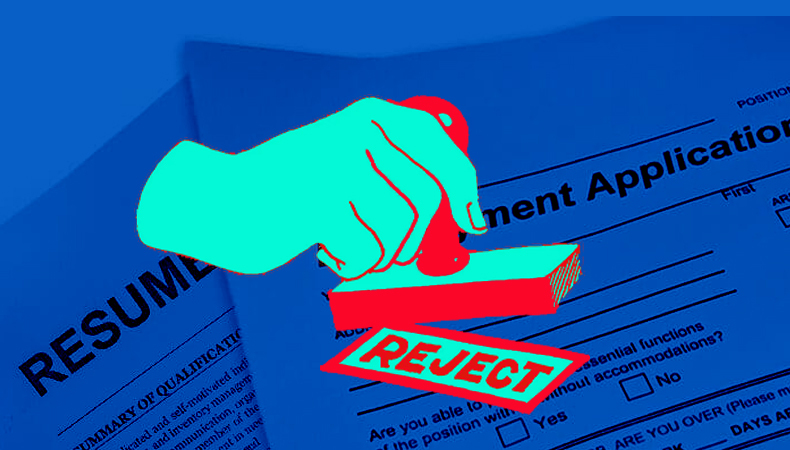10 Reasons Why Job Applications Are Rejected

Your education and credentials are impeccable. You have years of experience in your field. You have researched, prepared, and carefully tailored your résumé, but somehow, your job applications are still being rejected. What are you doing wrong?
The job hunting cycle can be stressful, and with the ease of online applications, thousands of applicants may apply for a single job opening, making it difficult to break free. Getting to a manageable selection requires hiring managers to be ruthless in discarding candidates.
You can avoid these mistakes, which will automatically disqualify you. We have spoken to HR, recruitment, and résumé experts to identify your errors.
Discover the 10 most common reasons for a rejected job application, and how to overcome them!
1.You didn’t pass the ATS with your résumé
A company’s first look at your application, cover letter, and résumé may not even be a person. An applicant tracking system (ATS) is often used by large companies that receive a high volume of candidates. In order to determine whether your application, particularly your résumé, matches up with the job requirements, this software uses complex algorithms.
Those that don’t match well are discarded and never seen by the hiring manager. But there is a way around the ATS system. It is important to use industry buzzwords and keywords in your resume, a clean format, and a sans serif font in order to get the robots to like you. Do some research on what is good ATS formatting before you write your résumé.
2.Your application was not proofread
In her role as lead trainer for Haro Helpers, Abigail Dodwell emphasizes that typos and misspellings automatically result in rejection. Even the tiniest errors in medical transcriptions can have dire consequences, she points out, and a spelling error in a marketing campaign can cost you a client.
It is important to double-check your work, then ask a friend or family member to check for any mistakes. “A job can be your life in some cases,” Dodwell stresses, “so taking an extra 10 minutes to check over your résumé pales in comparison.”
3.There was too much information in your application
Beware of overcrowding your résumé as “too long; didn’t read” is a thing in the business world as well.
This is also a common résumé mistake. The key is to put yourself in the hiring manager’s shoes, says Laos, as they go through dozens or even hundreds of applications. Think less about what you want to share and more about what’s important to the hiring manager, including their time. You should also keep this in mind when following up on an application.
Read | Kuwaiti actress Rawan Mahdi stars in Netflix’s ‘The Exchange’
4.There was a mismatch between your experience level and the job requirements
This is one of the most common reasons an application is rejected, according to many recruiting experts. Typically, underqualification is the problem, but it could also be that your experience is in a slightly different role or field. It is even possible to be rejected for being overqualified.
5.You did not highlight your transferrable skills
As Matthew Warzel, a certified recruiter and president of MJW Careers, explains, hiring managers are looking for candidates who can seamlessly transition from one job to the next.
You should highlight your transferable skills on your résumé and LinkedIn profile if your experience does not exactly match the job description.
When you don’t know how your skills will translate to a new job, you’ll have to endure another rejection on your job application. You can help by following up with the recruiter at this point. Hopefully, you will receive a response that will assist you in tailoring your résumé for the next opportunity. Ask politely if they can suggest improvements that could improve your chances of getting hired.
6.You did not follow the application instructions
You’ve probably seen many job ads that insist candidates follow directions, even if you’ve only been job hunting for a short period of time.
According to David Reischer, the hiring manager at LegalAdvice.com, applicants often fail to provide writing samples.
According to Reischer, it is an easy decision to disqualify someone for not following directions in the application process.
Once you’ve filled out the application and tailored your résumé, reread the instructions. Employers may specify the subject line for an email, request a cover letter, or even include a code word to ensure you’re paying attention.
7.You haven’t worked for a while
Technology and globalization can drastically change jobs and industries in a short period of time. The hiring manager will choose the candidate who is already up to speed over someone who has been out of work for over a year.
8.You rushed the application process
Today’s employees may struggle to answer application questions in complete sentences in a world of slang, abbreviations, and truncated speech.
The time you have to market yourself to hiring managers is limited. You may be able to answer application questions succinctly with one-word answers or fragments that lack proper punctuation, but you may seem rushed or apathetic compared to candidates who respond grammatically correctly. Take advantage of this opportunity to demonstrate your written communication skills.
9.In your application, you lied
Job seekers often make this mistake, unfortunately. It is best, to be honest when applying for a job. There are ways to highlight your strengths and minimize your weaknesses without telling a lie.
10.You didn’t write a cover letter
The cover letter is an essential part of any job application, but many people neglect it. Simply attaching your résumé to an email won’t impress anyone. In fact, it will make you appear careless and lazy.
If you’re applying for a job, be sure to include a customized cover letter to convince the hiring manager that you’re the right person for the position.
It is estimated that 90% of job seekers have their CVs rejected before they reach the hiring manager. Although you may not always know why your application was rejected, hopefully, this guide will help you limit the rejections you receive and land a brand-new job!



